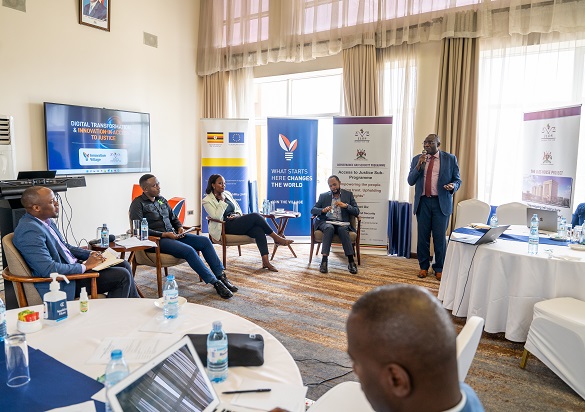L-R: Arthur Mukembo, Future Lab’s Lead at the Innovation Village, Timothy Kakuru, Director Programs and Impact, Barefoot Law, Rita Ngenzi, National Coordinator at International Trade Centre, Musa Muto, Governance and Security Programme Secretariat at JLOS and Sam R. Wairagala, Deputy Senior Technical Advisor JLOS during the stakeholder engagement on digital transformation and innovation in access to justice.
Justice, Law and Order Sector (JLOS) under the Governance and Security Programme in collaboration with the Innovation Village and with support from the European Union (Justice and Accountability Reform) yesterday organized a workshop to engage a wide range of stakeholders on how technology can be leveraged to improve access to justice.
Worldwide, the justice system has been designed in a way that makes access to legal processes difficult for a regular person. This is clearly seen in the complexity of the language or terminologies used, behavioral protocols, and even the way courtrooms are designed seems to intentionally put barriers between the judges, lawyers, and the rest of the ordinary people. This is not different in Uganda.
Held under the theme: Creating solutions, partnerships and synergies for a digitally driven and integrated justice ecosystem, the stakeholder workshop tackled key areas within the justice sector where technology can be leveraged to enable faster, more efficient case management, effective conflict resolution, and easy access to the legal system.
Speaking at the workshop in his keynote address, Mr. Sam Rogers Wairagala the Deputy Senior Technical Advisor at Governance and Security (JLOS) Secretariat said, “Today, technology is increasingly being pitched as a solution to ease access to justice. Whereas challenges and bottlenecks exist in the adoption of technology in Uganda’s legal and justice system, efforts are being made by different players within the sector to ensure that digital innovations such as video conferencing for court hearings, e-case filings, digital exhibits and evidence presentation are increasingly used during legal processes.”
He added, “At JLOS, we believe technology has the potential to transform access to justice and improve the entire legal system. If well leveraged, digital tools can enable justice institutions optimize and refocus their business processes, improve service delivery to users, protect human rights and democratize access to justice.”
Edgar Kuhimbisa, the e-Justice and digital transformation lead at the JLOS Secretariat in his remarks reinforced the need for public-private partnerships in driving the digital justice agenda: “Our collaboration with players in this ecosystem such as the Innovation Village through the LegalTech Lab is crucial in enabling us innovate around development of digital legal solutions that can optimize citizen interaction with the justice institutions to ease the justice journey of the ordinary Ugandan”, Mr. Kuhimbisa noted.
Hellen Mukasa, LegalTech Lab Lead at the Innovation Village said that “Transforming the justice sector through innovation makes the justice system more accessible and equitable to all which helps streamline administrative processes, avoid red tape, and reduce massive court cases and backlogs currently experienced by the system.
Through the introduction of e-justice platforms, citizens will be able to navigate the complexities of the law and enjoy more frequent and quality interaction with justice institutions which improves citizen engagement, transparency, and accountability of justice institutions. Mukasa said.
Mukasa said, “Through Future Lab studio, we shall conduct a grand hackathon challenge that will bring together founders, developers, corporations, and other stakeholders to hack solutions to challenges preventing unserved and underserved communities from reaching their full potential. Dubbed as “Grand Hack” the challenge will leverage interdisciplinary innovation to tackle systemic challenges in the target opportunity spaces Innovators can innovate around either Community Driven Development, Last Mile Access, or Innovative Finance” She added.
“The innovators will be supported to identify gaps within the justice system through coaching and mentorship during the incubation and accelerator programs with the aim of taking their innovations to market” Mukasa added.
Although the process of digitalizing the justice system has started, bringing the courts and the entire justice system into the digital age is a complex and monumental task. To make it a success, our traditional understanding of access to justice must be rethought, and ambitious digital strategies must be developed and implemented.





